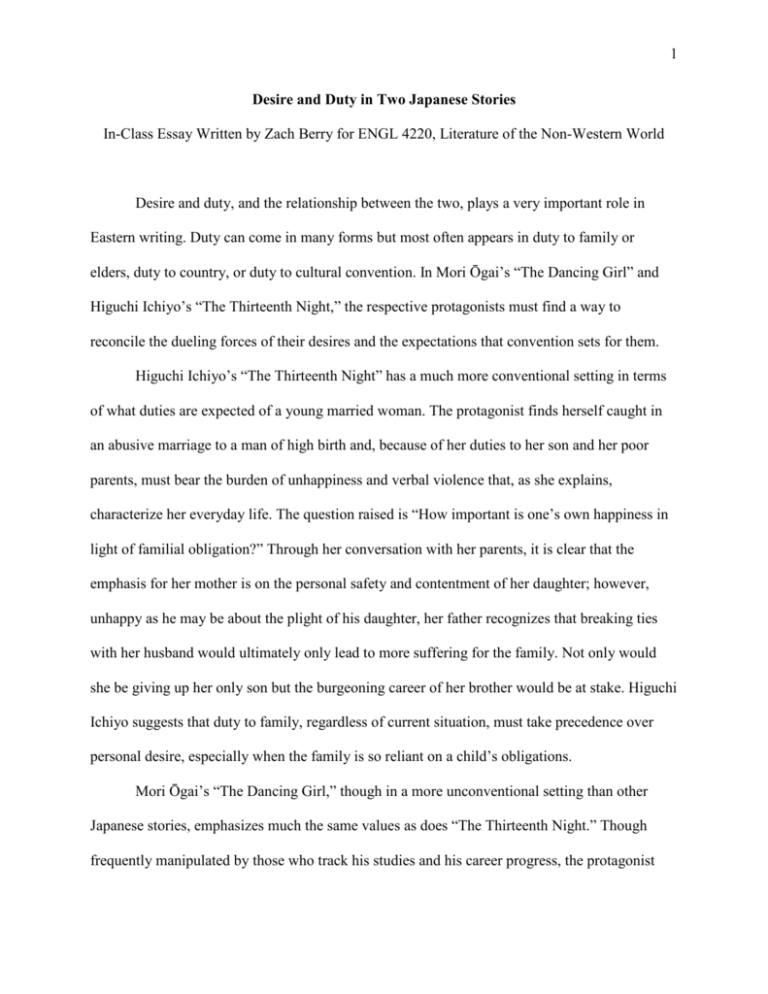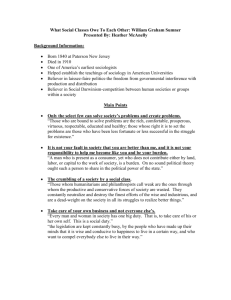Sample In-Class Essay
advertisement

1 Desire and Duty in Two Japanese Stories In-Class Essay Written by Zach Berry for ENGL 4220, Literature of the Non-Western World Desire and duty, and the relationship between the two, plays a very important role in Eastern writing. Duty can come in many forms but most often appears in duty to family or elders, duty to country, or duty to cultural convention. In Mori Ōgai’s “The Dancing Girl” and Higuchi Ichiyo’s “The Thirteenth Night,” the respective protagonists must find a way to reconcile the dueling forces of their desires and the expectations that convention sets for them. Higuchi Ichiyo’s “The Thirteenth Night” has a much more conventional setting in terms of what duties are expected of a young married woman. The protagonist finds herself caught in an abusive marriage to a man of high birth and, because of her duties to her son and her poor parents, must bear the burden of unhappiness and verbal violence that, as she explains, characterize her everyday life. The question raised is “How important is one’s own happiness in light of familial obligation?” Through her conversation with her parents, it is clear that the emphasis for her mother is on the personal safety and contentment of her daughter; however, unhappy as he may be about the plight of his daughter, her father recognizes that breaking ties with her husband would ultimately only lead to more suffering for the family. Not only would she be giving up her only son but the burgeoning career of her brother would be at stake. Higuchi Ichiyo suggests that duty to family, regardless of current situation, must take precedence over personal desire, especially when the family is so reliant on a child’s obligations. Mori Ōgai’s “The Dancing Girl,” though in a more unconventional setting than other Japanese stories, emphasizes much the same values as does “The Thirteenth Night.” Though frequently manipulated by those who track his studies and his career progress, the protagonist 2 complains that those conventions are stifling and unrealistic. Despite that, it is initially his own desires that lead him away from home to Germany, a fact that he recognizes when he comments on leaving his mother behind and her age. Once his initial desire to be with the dancing girl is realized, he succumbs to duty again and again, through the Japanese ambassador to Russia and through his longtime friend who suggests his return to Japan. All of his desire for a relationship with the mother of his child cannot overshadow the fact that the cultural conventions of duty, to country and parents, are what ultimately motivate the protagonist. The irony lies in the fact that he had actually started to construct something resembling a family in Germany, living with his pregnant wife-to-be and her mother. These do not constitute a traditional “family” in his mind and thus are not held to the same standards as a nuclear Japanese family; he feels no sense of duty or obligation to people who have taken care of him and sacrificed for him. Both of these stories present the dichotomous relationship between individual desire and traditional duty in such a way as to suggest that duty takes precedence every time. “The Thirteenth Night” presents the obligations to family in a much more traditional sense: Sacrifice must be made to honor parents and husband and to provide for children. On the other hand, “The Dancing Girl,” by using a very un-Japanese setting, upsets the conventions of duty to family: instead of honoring those who were essentially family, the protagonist leaves them in a state of decay, the young girl insane and pregnant. Ōgai seems to want to inject a sense of irony into the story. Both of these stories present very different views on the opposing forces of personal desire and duty in the lives of Japanese people.







![(NPD-60) []](http://s3.studylib.net/store/data/007320126_1-47edb89d349f9ff8a65b0041b44e01a8-300x300.png)
